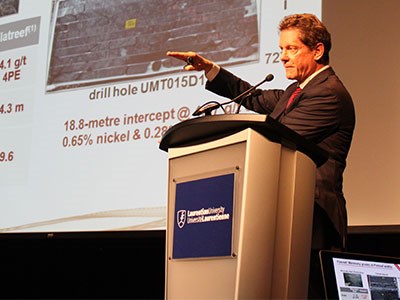Robert Friedland is going Hollywood.
The billionaire mining mogul has purchased a Hollywood film studio to make movies—but he’s not ditching his bread and butter any time soon.
Friedland’s goal is to produce films that highlight the importance of mining and underscore the urgency of finding new ore bodies to satisfy the globe’s growing appetite for metals.
“It’s remarkable how many people who live in urban environments don’t understand the supply chain,” Friedland said during an Oct. 9 talk at Laurentian University in Sudbury. “They don’t understand that if you walk in the room to turn on a light switch, somewhere a generator has to kick in and provide that power; there’s no storage of electricity in the grid.”
Friedland, the chairman and founder of Ivanhoe Capital Corp. and executive chairman and founder of Ivanhoe Mines Ltd., gave the inaugural lecture in a series presented by the Goodman School of Mines.
Named one of the most influential Canadians by Financial Post Magazine, Friedland is an original investor in Diamond Fields Resources, which discovered the Voisey’s Bay nickel deposit and led negotiations during the project’s $4.3-billion sale to Inco in 1996.
As the earth’s population grows, urbanization is the most compelling event facing the world today, and it has significant implications for the mining industry, Friedland said.
In November, the Japanese will unveil the first mass-produced fuel-cell automobile, which creates no emissions, but uses copious amounts of platinum, he said.
The Chinese, meanwhile, are spending $100 billion a year building highspeed trains and recently unveiled the fastest train the world. Operating by magnetic levitation, it travels 581 km/hr.
More people today live in cities than in urban areas, and with that comes a “massive explosion” in consumer demand, in both developed and developing countries, for everything from electricity and air conditioners to smart phones and wireless Internet, Friedland said.
All this translates into a greater demand for metals that make it all work.
“The global supercycle is very much alive,” Friedland said. “Anybody who tells you the metals supercycle is over—that’s completely idiotic.”
A Canadian company based in Vancouver, Ivanhoe Mines’ operations are based in South Africa, where the company is mining gold, copper, zinc, nickel and precious group metals. But at the same time miners feed demand, they need to mine responsibly and ethically, Friedland said.
The company is continuing to develop new technology he believes will “revolutionize” mineral exploration in areas like Africa, where workers make $12 a day and toil in hazardous near-claustrophobic conditions.
To help facilitate change, Ivanhoe Mines will fund a research chair position in the School of Physical Sciences department at University of Limpopo in South Africa. Friedland envisioned collaborations between the University of Limpopo and Laurentian University for training young miners.
“A really great dream would be to get people from Sudbury involved—young geologists, young mining engineers from Sudbury working here—and also to get a lot of young Africans coming to Sudbury to study to get some cross-pollination and development of this resource,”said the miner.
Meanwhile, Friedland the movie producer plans to make an announcement about a joint film venture soon.
His first project will be a series called Copper, which will take place in the 24th century when the earth is powered by geothermal energy and everything is electric.
No one consumes hydro carbons or coal in this futuristic scenario, but with 27 billion people on earth driving electric cars, the copper supply has run out and miners have turned to Mars to feed demand. Friedland is hoping to source a compelling script that “subliminally educates people” on the origins of consumer products.
“We’re just tired of the mining industry being kicked in the head as if people in mining are doing some kind of inherently evil thing,” he said.




